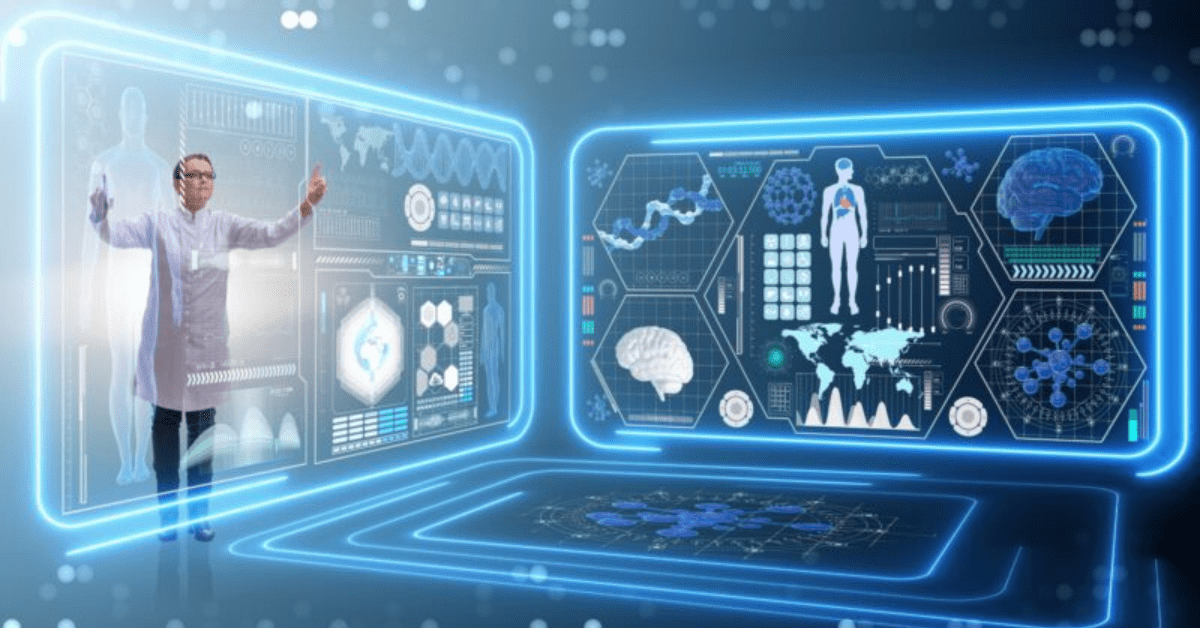Artificial Intelligence (AI) is at the forefront of a technological revolution, and its applications in healthcare are reshaping the medical industry. From early disease detection to personalized treatment plans, AI in healthcare has proven to be a game-changer. This article delves into how AI is transforming healthcare, its benefits, challenges, and future potential.
What is AI in Healthcare?
AI in healthcare refers to the use of machine learning algorithms, natural language processing, and data analytics to assist in diagnosing diseases, predicting outcomes, and improving patient care. By analyzing vast datasets, AI can uncover patterns and insights that are impossible for humans to detect manually.

The Benefits of AI in Healthcare
1. Enhanced Diagnostics
AI-powered tools analyze medical imaging, such as X-rays and MRIs, with greater precision and speed than traditional methods.
2. Personalized Medicine
AI enables the development of personalized treatment plans by analyzing an individual's genetic makeup, lifestyle, and medical history. This approach increases the effectiveness of treatments while minimizing adverse effects.
3. Predictive Analytics
AI-driven predictive models help healthcare providers anticipate patient outcomes and intervene proactively. For instance, AI can predict the likelihood of readmissions, complications, or disease progression.
4. Administrative Efficiency
AI automates administrative tasks, such as billing, scheduling, and maintaining electronic health records (EHRs). This reduces the workload on healthcare staff, allowing them to focus on patient care.
5. Drug Discovery and Development
AI accelerates drug discovery by identifying potential compounds and predicting their effectiveness. This reduces the time and cost of bringing new drugs to market, benefiting patients worldwide.
Applications of AI in Healthcare
1. Medical Imaging
AI algorithms analyze medical images for early disease detection, such as identifying tumors in mammograms or detecting fractures in X-rays. These tools improve diagnostic accuracy and reduce human error.
2. Virtual Health Assistants
AI-powered virtual assistants provide patients with information, reminders for medication, and answers to common health queries. Examples include chatbots and voice assistants like Alexa and Siri, tailored for healthcare use.
3. Robotic Surgeries
AI-guided robotic systems enhance the precision of complex surgeries. These systems assist surgeons by providing real-time data and ensuring minimal invasiveness.
4. Telemedicine
AI facilitates remote consultations by analyzing patient symptoms and medical history. It also assists doctors in providing accurate diagnoses and treatment recommendations during virtual appointments.
5. Chronic Disease Management
AI tools monitor patients with chronic conditions, such as diabetes or hypertension, by analyzing real-time data from wearable devices. This ensures timely interventions and better disease management.
management.
6. Mental Health Support
AI-powered platforms like Woebot and Wysa offer mental health support through chat-based interactions, providing therapy and coping strategies. These tools make mental health resources more accessible, especially in underserved areas.
7. Public Health Surveillance
AI aids in tracking and predicting disease outbreaks by analyzing patterns from social media, news reports, and medical records. This helps governments and healthcare organizations respond proactively to public health crises.
Challenges and Ethical Concerns
1. Data Privacy and Security
Healthcare data is highly sensitive, and AI systems must comply with regulations like HIPAA and GDPR. Ensuring the security of patient data remains a significant challenge.
2. Bias in Algorithms
AI models can inherit biases from the datasets they are trained on, leading to disparities in healthcare outcomes. Addressing this requires diverse and representative data.
3. High Implementation Costs
The adoption of AI technologies involves significant investment in infrastructure, training, and maintenance, which can be a barrier for smaller healthcare providers.
4. Legal and Regulatory Issues
The lack of standardized regulations for AI in healthcare creates uncertainty about accountability, especially in cases of errors or adverse outcomes.
The Future of AI in Healthcare
The potential of AI in healthcare is limitless. Future advancements include:
- Advanced Predictive Models: AI will provide even more accurate predictions for disease outbreaks and individual health risks.
- Integration with Wearable Devices: Smart devices will work seamlessly with AI systems to deliver real-time health monitoring and feedback.
- Global Health Applications: AI can bridge healthcare gaps in underserved regions by providing diagnostic tools and virtual consultations.
- Genomics and Precision Medicine: AI will play a significant role in decoding genomes faster and more accurately, enabling precise treatments for genetic disorders. Platforms like Deep Genomics are already pioneering this field (source).
- AI in Rehabilitation: Tools like NeuroRehab VR are leveraging AI to create personalized rehabilitation programs for patients recovering from strokes or injuries (source).
As AI continues to evolve, it promises to revolutionize the medical field, making healthcare more accessible, efficient, and patient-centered.
Conclusion
AI in healthcare is transforming the industry, offering innovative solutions to long-standing challenges. From enhancing diagnostics to enabling personalized medicine, AI has the potential to revolutionize patient care. However, addressing challenges such as data privacy and algorithmic bias is crucial to realizing its full potential. For more insights on how AI is shaping the future, visit Tech Talks Today.
AI’s integration into healthcare is not just a trend but a necessity for advancing medical science and improving patient outcomes. Embracing this technology responsibly will ensure a healthier future for all.

